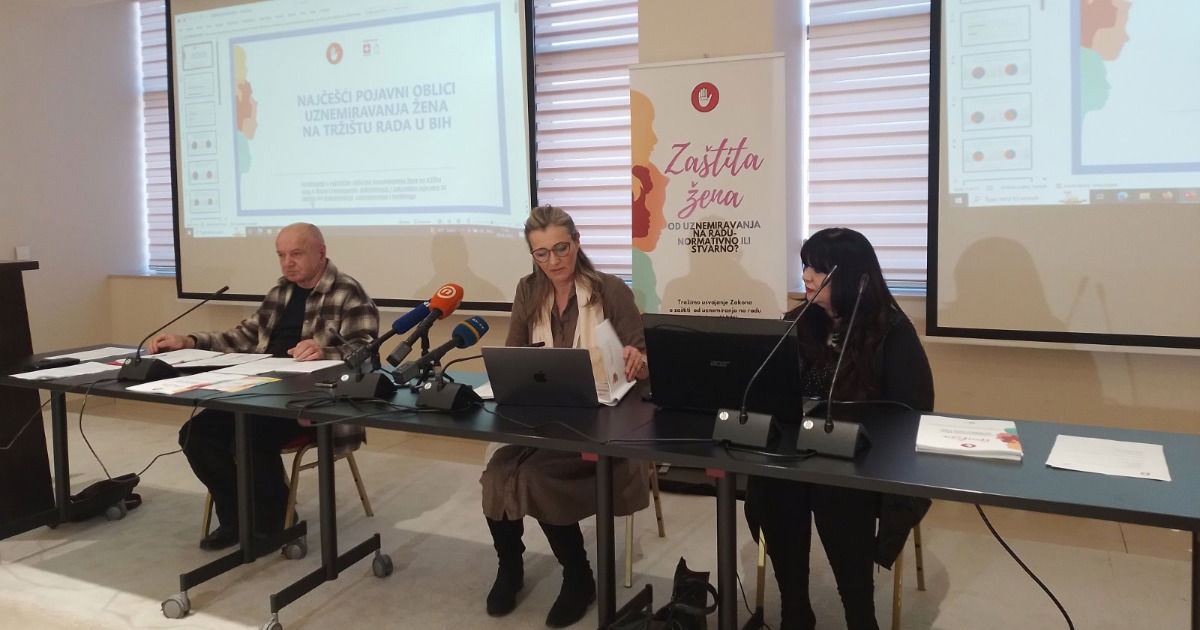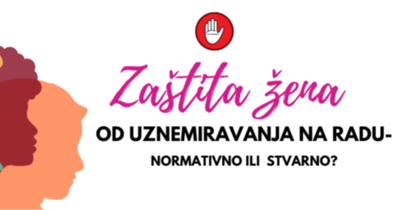
As many as 72% of surveyed women in the Federation of BiH stated that they have experienced some form of workplace violence, while in the Republika Srpska, that percentage is 57%, it was announced today at a press conference in Mostar during the presentation of the research "Most common forms of harassment of women in the labor market in BiH."
This analysis, which is part of the project "Protection of women from harassment in BiH - normative or real," was conducted by the citizens' association "Stop Mobbing" in collaboration with the partner organizations "Center for the Development of Civil Society" from Doboj, the association "Ruka ruci" from Bihać, and the citizens' association "Radio Club" from Gračanica, based on a total sample of 1,431 respondents from both entities in BiH.
"The results of the research are being used for an advocacy campaign aimed at adopting the Law on protection from harassment in the eorkplace in the Federation of BiH. At the same time, by talking to workers and employers in the field, we conducted monitoring of the implementation of the Law on protection from harassment in the Republic of Srpska, which was adopted in 2021", stated Anica Ramić, president of the "Stop Mobbing" Association.
She emphasized that "it is devastating that as many as 59% of respondents in RS and 36% in FBiH stated that they do not know who to turn to in cases of workplace violence".
Additionally, 66% of respondents in FBiH believe that there is no effective system for protection from workplace violence, while in the Republic of Srpska, 50% of women share the same opinion, according to the analysis.
Ramić added that the respondents, in their narrative answers, explained their experiences in attempting to report harassment at work, such as: "Whoever reports, experiences even worse harassment", "No institution or organization reacted to my reports, and instead, they all worked together against me", "After almost two years of suffering, followed by attempts to protect myself through the law, I ultimately had to leave that workplace", "Not only was the problem not resolved after reporting, but my work contract will not be renewed", "The worker just goes through even worse after reporting".
According to the legal advisor of the "Stop Mobbing" Association, Esad Bećirović, "the responses from the surveyed women clearly show a strong lack of trust in the protection system, both in the Federation of BiH, where there is no adopted Law on protection from harassment in the workplace, and in the Republic of Srpska, where such a law exists".
"We provide free legal support to women who suffer any form of workplace violence, and we are often contacted by individuals seeking help. In a short period, I have communicated with more than 50 women who claim that they cannot quit their jobs because it would jeopardize their own and their family's livelihood, while on the other hand, they spend a third of their lives at a workplace where they endure belittlement, insults, and even physical abuse, which often leads to the development of various illnesses", said Bećirović.
Anica Ramić emphasizes that it is a devastating fact that women, even after reporting workplace violence, do not receive adequate protection, and many of them are forced to leave their jobs, especially after reporting such incidents.
"Sexual harassment in Bosnia and Herzegovina is still a taboo subject. Judging by the small or nonexistent penalties, societal condemnation, the number of reported cases is surprisingly low. Abuse usually remains unreported, perpetuating the vicious cycle of further harassment", it was stated during the presentation of the research.
During the work on the analysis, the "Stop Mobbing" Association noted a significant lack of transparency in the operations of both private and public institutions, as well as civil society organizations. Out of a total of 59 letters sent to legal entities, responses were received from only 13 of them for the purposes of this analysis. Only three legal entities reported that they had received complaints of workplace harassment, mobbing, and discrimination during 2023 and 2024. In total, there were 13 complaints from workers. Of this number, 9 women submitted complaints, and 4 men did.
The recommendations of the research indicate that the alarmingly high number of workplace human rights violations could be reduced if the provisions of the Law on protection from harassment in the workplace in the Republic of Srpska were more strongly promoted and consistently implemented, and if such a law were adopted as soon as possible in the Federation of BiH.
Additionally, it is crucial to ensure that victims of workplace harassment can report violence in a simple way, as a large number of the surveyed women stated that there is no effective protection system against harassment at work and that they do not know to whom such cases can be reported.
"It is important for employers and managers to understand that these problems negatively affect the productivity and quality of business operations of any legal entity. We remind you that the average person spends a third of their life at work, which is why it is crucial to approach this issue seriously in order to have productive and satisfied employees, owners of legal entities, and ultimately, satisfied consumers of their services as a result of a stimulating work atmosphere", concluded Ramić.





